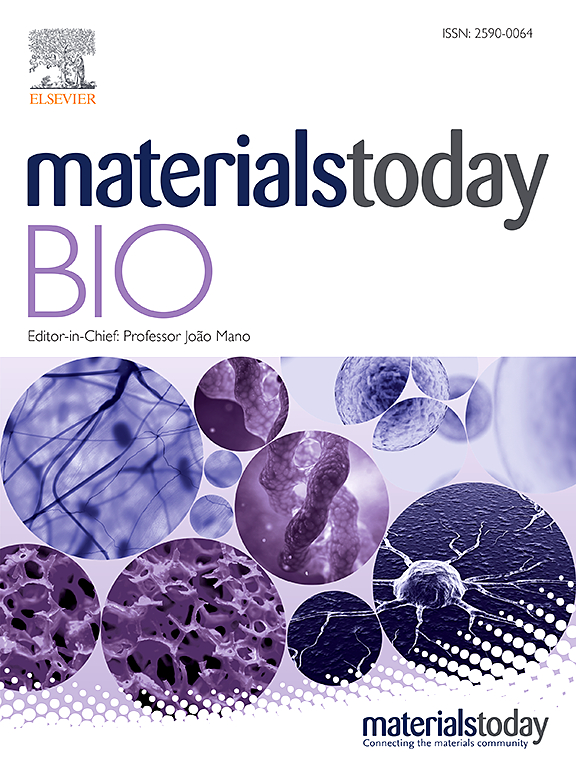Nanoencapsulation platform for oral delivery of peptides: In vitro stabilization of AvPAL and formulation of a gastrointestinal-resistant luciferase
IF 8.7
1区 医学
Q1 ENGINEERING, BIOMEDICAL
引用次数: 0
Abstract
Phenylketonuria (PKU) is a genetic metabolic disorder caused by an enzyme deficiency that leads to the accumulation of phenylalanine, which can cause neurotoxicity and several other problems. A potential alternative to the universal standard treatment based on a lifelong protein-restricted diet, is the development of oral replacement therapies using phenylalanine ammonia lyase from Anabaena variabilis (AvPAL). However, oral administration of polypeptides presents a major challenge due to gastrointestinal (GI) instability. To address this issue, the use of the IC-Tagging system as an advanced one step, in cellulo nanosphere (NS)-encapsulation strategy for protein stabilization and oral delivery is proposed. A highly active version of AvPAL was produced to which nanoencapsulation provides formidable thermostability, resistance to acidic pH, long-term storage stability and protection against proteolytic degradation. This latter characteristic, essential for oral delivery of polypeptides, is further enhanced by coating with chitosan the NS-encapsulated enzyme. Thus, a similarly nanoencapsulated and chitosan-coated luciferase displays sustained enzymatic activity through the entire GI transit when administered orally in mice, indicating the high protective capability of the system while maintaining the availability of the enzyme. Overall, these results highlight the potential and versatility for peptide-based oral delivery applications of this innovative methodology.
口服多肽的纳米胶囊化平台:AvPAL的体外稳定性和胃肠道耐药荧光素酶的配方
苯丙酮尿症(PKU)是一种由酶缺乏引起的遗传代谢紊乱,导致苯丙氨酸的积累,这可能导致神经毒性和其他一些问题。基于终身蛋白限制饮食的通用标准治疗的一个潜在替代方案是口服替代疗法的开发,该疗法使用的是来自变水蛭的苯丙氨酸解氨酶(AvPAL)。然而,由于胃肠道(GI)不稳定,多肽的口服给药提出了一个主要挑战。为了解决这一问题,本文提出了利用ic标记系统作为一种先进的一步,在纤维素纳米球(NS)中进行蛋白质稳定和口服递送的封装策略。一种高活性的AvPAL被生产出来,其纳米封装提供了强大的热稳定性,耐酸性pH值,长期储存稳定性和防止蛋白水解降解的保护。后一种特性对于多肽的口服递送至关重要,通过壳聚糖包覆ns封装酶进一步增强。因此,类似的纳米封装和壳聚糖包被的荧光素酶在小鼠口服时,在整个胃肠道运输中显示出持续的酶活性,表明该系统具有高保护能力,同时保持酶的可用性。总的来说,这些结果突出了这种创新方法的肽基口服给药应用的潜力和多功能性。
本文章由计算机程序翻译,如有差异,请以英文原文为准。
求助全文
约1分钟内获得全文
求助全文
来源期刊

Materials Today Bio
Multiple-
CiteScore
8.30
自引率
4.90%
发文量
303
审稿时长
30 days
期刊介绍:
Materials Today Bio is a multidisciplinary journal that specializes in the intersection between biology and materials science, chemistry, physics, engineering, and medicine. It covers various aspects such as the design and assembly of new structures, their interaction with biological systems, functionalization, bioimaging, therapies, and diagnostics in healthcare. The journal aims to showcase the most significant advancements and discoveries in this field. As part of the Materials Today family, Materials Today Bio provides rigorous peer review, quick decision-making, and high visibility for authors. It is indexed in Scopus, PubMed Central, Emerging Sources, Citation Index (ESCI), and Directory of Open Access Journals (DOAJ).
 求助内容:
求助内容: 应助结果提醒方式:
应助结果提醒方式:


